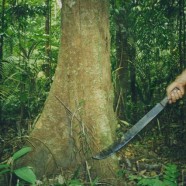The fragrance of rosewood floats over CITES
This morning, the 15th Conference of States at CITES decided by consensus to approve the Brazilian proposal to list Brazilian rosewood (Aniba rosaeodora) in Appendix 2. The international trade in rosewood essential oil will be controlled from now in importing and exporting countries. The listing makes a provision for the exclusion of finished products, packaged and ready for sale. Ladies, you do not need a CITES permit to travel with your No5.
Brazilian rosewood is also called pau rosa, its Brazilian name, to avoid confusion with other species from around the world which are also named rosewood because of their color. Pau rosa is exclusively present in the Amazon basin, principally in Brazil and French Guiana. Some populations were counted in Colombia, Peru, Ecuador, Guyana, Suriname, and Venezuela. As the Brazilian proposal emphasizes, the growth of this tree is slow while its exploitation is rapid. The harvesting surpasses its capacities for natural re-growth. All the countries in the region supported Brazil, as well as Mexico and Costa Rica on behalf of 25 Central American and Caribbean countries. Those which were against it didn’t so much as lift a finger.









